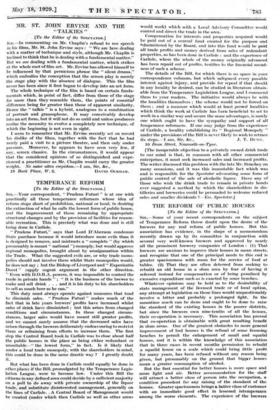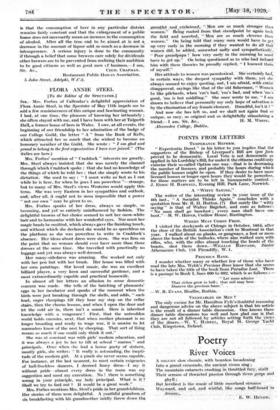THE REFORM OF PUBLIC HOUSES
[To the Editor of the SpEcra•roa.] Sra,—Some of your -recent correspondents on the subject of Temperance Reform throw doubt upon the desire of the brewers for any real reform of public houses. But this association has evidence, in the shape of a memorandum recently drawn up by its committee in conjunction with several very well-known brewers and approved by nearly all the prominent brewery companies of London : (1) That brewers are anxious to improve their houses in mean streets, and recognize that one of the principal needs to this end is greater spaciousness with room for the service of food at tables. (2) That they are often deterred from seeking to rebuild an old house in a slum area by fear of having it referred instead for compensation or of being penalized by excessive expenditure such as is exacted by some benches.
Whatever opinions may be held as to the desirability of state management of the licensed trade or of local option, any attempt at legislation on those lines would unquestionably involve a bitter and probably a prolonged fight. In the meantime much can be done and ought to be done to raise the standard of the existing houses in the poorer districts, but since the brewers own nine-tenths of all the houses, their co-operation is necessary. This association has proved that co-operation is obtainable with great resulting benefit in slum areas. One of the greatest obstacles to more general improvement of bad houses is the refusal of some licensing benches to permit the enlargement of small and squalid houses, and it is within the knowledge of this association that in three cases in recent months permission to rebuild a squalid house on a scale which could bring little profit for many years, has been refused without any reason being given, but presumably on the ground that bigger houses mean a greater consumption of alcohol.
But the first essential for better houses is more space and more light and air. Better accommodation for the staff will attract a better class of person into the occupation, a condition precedent for any raising of the standard of the houses. Greater spaciousness brings a better class of customer with an immediate good effect in lessened intemperance among the worse elements. The experience of the brewers
is that the consumption of beer in any particular district remains fairly constant and that the enlargement of a public house does not necessarily mean an increase in the consumption of alcohol. After aR the true end to be aimed at is not a decrease in the amount of liquor sold so much as a decrease in intemperance. A serious injury is done to the community if through a belief that some brewers care solely for dividends other brewers are to be prevented from realizing their ambition to be good citizens as well as good men cf business.—I am, Sir, Sze., . CECIL CHAPMAN. Restaurant Public Houses Association, 5 John Street, Adelphi, W.C.2.













































 Previous page
Previous page